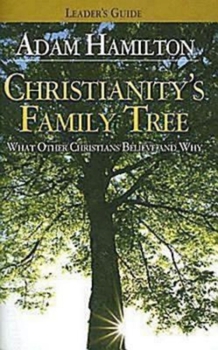Christianity's Family Tree Leader's Guide: What Other Christians Believe and Why
Select Format
Select Condition 
Book Overview
Adam Hamilton presents a generous, inspiring vision of eight Christian denominations and faith traditions. Comparing the Christian family to our own extended families, he contends that each denomination has a unique, valuable perspective to offer on the Christian faith. The traditions included in this eight-week video-and-print study are Orthodoxy, Catholicism, Lutheranism, Presbyterianism, Anglicanism, Baptists, Pentecostalism, and Methodism. For...
Format:Paperback
Language:English
ISBN:0687466717
ISBN13:9780687466719
Release Date:August 2007
Publisher:Abingdon Press
Length:96 Pages
Weight:0.33 lbs.
Dimensions:0.3" x 6.3" x 8.5"
Customer Reviews
4 ratings
Finding your place in "The Family Reunion"
Published by Thriftbooks.com User , 15 years ago
In my spiritual pilgrimage, I've journeyed with believers in many different denominations. I've enjoyed my Orthodox and Catholic friends' emphasis on history, God's transcendence, mystery, and the role of saints and martyrs. I've enjoyed my Lutheran friends' emphasis on grace, Scripture-only, and priesthood-of-all-believers. I've enjoyed my Presbyterian friends' emphasis on God before human experience, sin, systematic theology, and reason. I've enjoyed my Episcopalian friends' emphasis on prayer, tradition, and (in some cases) fellowship-before-doctrine. I've enjoyed my Baptist friends' emphasis on evangelism and assurance of salvation, the Bible, and personal holiness. I've enjoyed my Pentecostal/charismatic friends' emphasis on the Holy Spirit, miracles and spiritual gifts, and the Second Coming. I grew up United Methodist which at times felt like a "grab-bag" or "crazy-quilt," even "lowest-common-denominator." I really appreciated the author's description of the United Methodist Church as "people of the extreme center." That takes effort and is not a "default" position. With more and more tension between liberal vs. conservative, evangelism vs. social outreach, individual vs. corporate faith/identity/purpose, etc., I came away with a renewed respect for the believers who've chosen to stay with the mainline churches, most of which have been experiencing decline. This book could also be a "user-friendly" resource for individuals who are seeking a (new) church family, as well as for the many who (like me) have felt disconnected or disillusioned, but aren't quite ready to throw out the baby with the dirty bath water.
Christianity's Family Tree
Published by Thriftbooks.com User , 16 years ago
This book is a valuable resource for anyone who wants to better understand Christian beliefs and why they vary. I am impressed that the book is written in a positive manner. The author, Adam Hamilton, stresses the effective beliefs and customs of eight Christian denominations that will strenghten us and allow us to know and grow closer to God.
Celebrating the Family Tree
Published by Thriftbooks.com User , 16 years ago
I just led a church study group based on this book and its related video series. Adam Hamilton presents the major denominational families respectfully and with insight. He gets at the theological core of each tradition and relates it to his own United Methodism (also the tradition of our group). Each description is enriched by an interview with a representative of that tradition. This is a great study for those who would like to get beyond "all churches are basically the same," as well as the common, often negative stereotypes people hold. While it is especially useful in a United Methodist context, I believe it would work well in other churches of the Wesleyan tradition and beyond. Those who enjoy this book would also appreciate Hamilton's study of Christianity and World Religions, which follows a similar format.
Christianity's Family Tree
Published by Thriftbooks.com User , 17 years ago
Written in an accessible sytle, Hamilton provides a general history and overview of eight mainline Christian denominations: Eastern Orthodox, Roman Catholic, Lutheran, Presbyterian, Anglican/Episcopalian, Baptist, Pentecostal and United Methodist. With each he provides a short (3-4 page) discussion into the beliefs and practices of that denomination and a model diagram of how that denomination might see itself in Christianity's history. Each chapter has footnotes and there is a bibiography at the end for more indepth reading into each denomination. He does not consider one denomination superior to another--rather that each is "nourished by the same sap, connected to the same trunk, anchored by the same roots." Recommended as a beginning overview of the plethora of Christian denominations.





